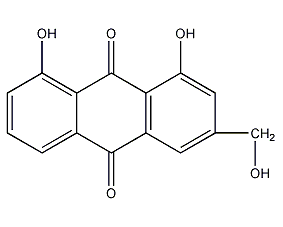1,8-Dihydroxy-3-(hydroxymethyl)anthraquinone


Structural formula
| Business number | 052B |
|---|---|
| Molecular formula | C15H10O5 |
| Molecular weight | 270.24 |
| label |
1,8-Dihydroxy-3-(hydroxymethyl)anthraquinone, Aloe-emodin |
Numbering system
CAS number:481-72-1
MDL number:MFCD00017373
EINECS number:207-571-7
RTECS number:CB6712200
BRN number:2059062
PubChem ID:None
Physical property data
1. Character:Orange needle-shaped crystal
2. Density (g/ m3,25/4℃): Undetermined
3. Relative vapor density (g/cm3,Air=1): Undetermined
4. Melting point (ºC): 223-224
5. Boiling point (ºC,Normal pressure): Undetermined
6. Boiling point (ºC,5.2kPa): Undetermined
7. Refractive Index: Undetermined
8. Flash Point (ºC): Undetermined
9. Specific optical rotation (º): Undetermined
10. Autoignition point or ignition temperature (ºC): Undetermined
11. Vapor pressure (kPa,25ºC): Undetermined
12. Saturated vapor pressure (kPa,60ºC): Undetermined
13. Heat of combustion (KJ/mol): Undetermined
14. Critical temperature (ºC): Undetermined
15. Critical pressure (KPa): Undetermined
16. Oil and water (octanol/Log value of water) partition coefficient: Undetermined
17. Explosion limit (%,V/V): Undetermined
18. Lower explosion limit (%,V/V): Undetermined
19. Solubility: Undetermined
Toxicological data
Mutagenicity data: MicroorganismsTESTSystem mutation: Bacteria–Salmonella typhimurium:100 ug/plate;
Microbial organisms TESTSystem mutation: Bacteria–Salmonella typhimurium:10 ug/plate;
Non-programDNA synthesisTESTSystem: rodent–Rat liver:10mg/L;
MicrotestTEST System: Rodents–Mouse lymphocytes: 20umol/L;
FormtransformationTEST System: Rodent–Mouse fibroblast: 3mg/L;
Mammalian somatic mutationscellsTEST system: rodent – mouse lymphocyte: 55500 nmol/L;
CytogeneticsanalysisTESTSystem: Rodent – Hamster Ovary: 18750ug/L;
Mammalian somatic mutationscellsTESTSystem: Rodent–Hamster lung: 10mg/L.
Ecological data
Generally not hazardous to water, do not discharge material into the surrounding environment without government permission.
Molecular structure data
1、 Molar refractive index:68.88
2、 Molar volume( m3/mol):169.7
3、 Isotonic specific volume (90.2K):520.5
4、 Surface tension(dyne/cm):88.4
5、 Polarizability(10 -24cm3): 27.30
Compute chemical data
1. Reference value for hydrophobic parameter calculation (XlogP): 1.8
2. Number of hydrogen bond donors: 3
3. Number of hydrogen bond acceptors: 5
4. Number of rotatable chemical bonds: 1
5. Number of tautomers: 24
6. Topological molecule polar surface area 94.8
7. Number of heavy atoms: 20
8. Surface charge: 0
9. Complexity: 421
10. Number of isotope atoms: 0
11. Determine the number of atomic stereocenters: 0
12. Uncertain number of atomic stereocenters: 0
13. Determine the number of chemical bond stereocenters: 0
14. Number of uncertain chemical bond stereocenters: 0
15. Number of covalent bond units: 1
Properties and stability
Use and store according to specifications, no decomposition will occur, and avoid contact with oxides
Storage method
2-8°C
Save in a sealed manner and place it in a ventilated and dry place to avoid contact with other oxides.
Synthesis method
None yet
Purpose
It has antibacterial effects and has inhibitory effects on staphylococci, streptococci, diphtheria, subtilis, dysentery and other bacilli. It also has a purgative effect and is used clinically as a laxative.
